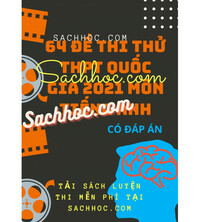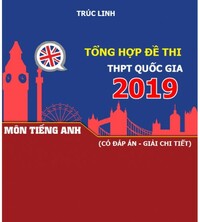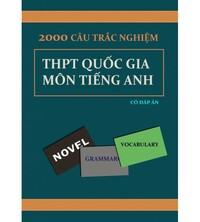Đề thi thử THPT Quốc gia môn Tiếng Anh
Cánh cửa bước vào giảng đường đại học thật gần, chỉ cần vượt qua kì thi THPT Quốc gia với điểm số cao, các bạn sẽ có thể theo học được tại những ngôi trường mình mong muốn, vào những khoa mình yêu thích, tạo nên tiền đề tốt cho sự nghiệp sau này. Tìm Đáp Án mời các bạn tham khảo Đề thi thử THPT Quốc gia môn Tiếng Anh trường THPT Thành phố Sa Đéc, Đồng Tháp năm 2015 để ôn tập môn Tiếng Anh tốt nhất, từ đó đạt kết quả cao trong kì thi THPT Quốc gia sắp tới.
Đề thi thử THPT Quốc gia môn Tiếng Anh trực tuyến trường THPT Cao Lãnh 2, Đồng Tháp năm 2015
Đề thi thử môn Anh THPT Quốc gia online năm 2016 (Giải thích chi tiết Key)
Đề thi thử THPT Quốc gia môn Tiếng Anh trường THPT Chuyên Nguyễn Đình Chiểu, Đồng Tháp năm 2015
ĐỀ THI MẪU TỐT NGHIỆP THPT QUỐC GIA NĂM 2015
ĐƠN VỊ: THPT TP SA ĐÉC
Mark the letter A, B, C, or D on your answer sheet to indicate the word whose underlined part is pronounced differently from that of the rest in each of the following questions.
Question 1: A. future B. mature C. pasture D. nature
Question 2: A. though B. encourage C. enough D. country
Mark the letter A, B, C, or D on your answer sheet to indicate the word that differs from the rest in the position of the main stress in the following question.
Question 3: A. marvelous B. attention C. consider D. excited
Question 4: A. canoeing B. opponent C. windsurfing D. defensive
Question 5: A. supernatural B. explanation C. redundancy D. electronic
Mark the letter A, B, C, or D on your answer sheet to indicate the correct answer to each of the following questions
Question 6: When I arrived at the meeting the first speaker.................speaking and the audience...................
A. just finished- were clapping B. had just finished- had clapped
C. had just finished- were clapping D. just finished- had clapped
Question 7: She had a..........................box
A. small round black wooden B. round small black wooden
C. small black round wooden D. round small wooden black
Question 8: Many people are involved (on/in/of/at) the use of English.
A. at B. of C. on D. in
Question 9: Even though we discuss the problem......................... during the department meeting, no one was able t come up ......................a solution
A. at times - under B. for short - to
C. by all means - for D. at length - with
Question 10: He advised me to take an English course. I ___ it early.
A. should have taken B. should take C. will have taken D. may take
Question 11: The girl __________ design had been chosen stepped to the platform to receive the award.
A. whose B. whom C. that D. which
Question 12: I could never sympathize with....................only criticized other people's work
A. such a person who B. such persons who
C. such persons that D. persons who
Question 13: Seldom ______ a newspaper.
A. buy Anna B. does Anna buy C. bought Anna D. Anna does buy
Question 14: He could not play in the game ___ his foot injury.
A. because B. due to the fact that C. because of D. for
Question 15: The furniture was _________.
A. such expensive that I couldn't buy it B. enough cheap for me to buy
C. so expense that I did buy it D. too expensive for me to buy
Question 16: You must explain your problems ................
A. as clear as you can B. as clearly as you can
C. as clear than you are D. as clearly as you are
Question 17: There is an inflation. The prices __________.
A. are going on B. are going down C. are going over D. are going up
Question 18: You can't get a soda from that machine. There 's a sign on it says that "..............."
A. Out of job B. Out of hand
C. Out of order D. Out of mind
Question 19: I accidentally ..............Mike when I was crossing a street downtown yesterday
A. kept an eye on B. lost touch with
C. paid attention to D. caught sigh of
Question 20: Peter was born and brought up In Hasting and knows it like the..............
A. nose on his face B. tip of his tongue
C. back of his hand D. hair on his head
Question 21: The group leader wanted that everyone worked together; she asked for everyone's ................
A. combination B. responsibility C. competition D. cooperation
Question 22: Our professor ........................said we should turn in the assignment on Friday
A. specific B. specifically C. specifying D. specification
Mark the letter A, B, C, or D on your answer sheet to indicate the word(s) that is CLOSET in meaning to the underlined part in each of the following questions.
Question 23: Laws on military service since 1960 still hold good
A. remain in effect B. remain for good
C. stand in life D. are in good condition
Question 24: There was nothing they can do, but leave the car at the roadside where it had broken down
A. unless B. except C. then D. instead of
Question 25: In astronomy, a scale of magnitude from one to six denotes the brightness of the star
A. examines B. signifies C. predict D. contrasts
Mark the letter A, B, C, or D on your answer sheet to indicate the word(s) that is OPPOSITE in meaning to the underlined part in each of the following questions.
Question 26: The soldiers were told to commence firing in the mock battle
A. continue B. stop C. begin D. evoke
Question 27: We ought to keep these proposals secret from the chairman for the time being
A. accessible B. revealed C. lively D. frequented
Mark the letter A, B, C, or D on your answer sheet to indicate the correct answer to each of the following questions.
Question 28: "You're so patient with us." "......................"
A. Thanks, that's nice of you to say so
B. Thanks. Have a nice trip
C. I'm fine, thanks
D. I know. I have trouble controlling my temper
Question 29: "Thank you for taking the time to come here in person." "............."
A. It is my pleasure
B. I don't know what time the person comes
C. I'd love to come. What time?
D. Do you have time for some gossip?
Mark the letter A, B, C, or D on your answer sheet to show the underlined part that needs correction in each of the following questions.
Question 30: We are working, that means that we are contributing goods and services to our society.
A B C D
Question 31: What we know about certain diseases are still not sufficient to prevent them from
A B C
spreading easily among the population.
D
Question 32: Psychologist Abraham Maslow argued that human have unique desires to discover and
A B
understand, the giving of love to others, and to fulfill their inner potential
C D
Question 33: There are many researches show that various species of animals have been extinct
A B C D
Question 34: The unemployed really needs to be given more help.
A B C D
Read the following passage and mark the letter A, B, C, or D on your answer sheet to indicate the correct word for each of the questions from 35 to 44.
Who talk more – men or women? Most people believe that women talk more. However, linguist Deborah Tannen, who has studied the communication style of men and women , says that this is a stereotype. According to Tannen, women are more verbal – talk more in private situations, where they use conversation as the "glue" to hold relationships together. But, she says, men talk more in public situations, where they use conversation to exchange information and gain status. Tannen points out that we can see these differences even in children. Little girls often play with one "best friend", their play includes a lot of conversation. Little boys often play games in groups; their play usually involves more doing than talking. In school, girls are often better at verbal skills, boys are often better at mathematics.
A recent study at Emory University helps to shed light on the roots of this difference. Researchers studied conversation between children age 3-6 and their parents. They found evidence that parents talk very differently to their sons than they do to their daughters. The startling conclusion was that parents use more language with their girls. Specifically, when parents talk with their daughters, they use more descriptive language and more details. There is also far more talk about emotions, especially sadness, with daughters than with sons.
Question 35. Which sentence best expresses the main idea of the first paragraph?
A. Little girls and little boys have different ways of playing.
B. Women talk more than men.
C. It's stereotype that women talk more than men.
D. Women talk more in private , and men talk more in public.
Question 36. Which word is similar in meaning to "glue" in line 3?
A. means B. sticky substance C. game D. rope
Question 37. Which sentence best expresses the main idea of the second paragraph?
A. Researchers have studied the conversations of children and their parents.
B. Parents do not talk much about sadness with their sons.
C. Study at Emory University can help to explain the differences between communication styles of boys and girls.
D. An Emory University found that parents talk more with their daughters than with their sons.
Question 38. Which of the following phrases best explains the meaning of the word "verbal"?
A. connected with the use of spoken language B. being very talkative
C. deriving from verbs D. using very loud noise
Question 39. The word they in line 3 refers to
A. situations. B. women C. men and women D. men
Question 40. Which can be used as a synonym of the word "feelings"?
A. anger B. emotions C. thinking D. worries
Question 41. Which of the following statements can be inferred from the first paragraph ?
A. Men and women have different styles of talking.
B. Men are more sociable than women.
C. In school, boys are better at verbal skills than girls.
D. Women talk more in public, men talk more in private.
Question 42. Which word could best replace "startling" ?
A. beginning B. annoying C. surprising D. interesting
Question 43. Which of the following statements can be inferred from the second paragraph?
A. Girls have more practice discussing sadness than boys do.
B. Parents don't enjoy talking with their sons as much as with their daughters.
C. A recent study found that parents talk differently to their sons and daughters.
D. Boys don't like to be with their parents as much as girls do.
Question 44. Which of the following statements is TRUE about the passage?
A. Parents use more language to talk with their daughters.
B. Boys don't like showing their emotions.
C. Parents give more love to their daughters than their sons.
D. Girls are thought to be more talkative than boys.
Read the following passage and mark the letter A, B, C, or D on your answer sheet to indicate the correct word for each of the blanks from 45 to 54.
Most forms of property are concrete and tangible, such as houses, cars, furniture or anything else that is included in one's possessions. Other forms of property can be intangible, and copyright deals with intangible forms of property. Copyright is a legal protection extended to authors of creative works, for example, books, magazine articles, maps, films, plays, television shows, software, paintings, photographs, music, choreography in dance and all other forms of intellectual or artistic property.
Although the purpose of artistic property is usually public use and enjoyment, copyright establishes the ownership of the creator. When a person buys a copyrighted magazine, it belongs to this individual as a tangible object. However, the authors of the magazine articles own the research and the writing that went into creating the articles. The right to make and sell or give away copies of books or articles belongs to the authors, publishers, or other individuals or organizations that hold the copyright. To copy an entire book or a part of it, permission must be received from the copyright owner, who will most likely expect to be paid.
Copyright law distinguishes between different types of intellectual property. Music may be played by anyone after it is published. However, if it is performed for profit, the performers need to pay a fee, called a royalty. A similar principle applies to performances of songs and plays. On the other hand, names, ideas, and book titles are excepted. Ideas do not become copyrighted property until they are published in a book, a painting or a musical work. Almost all artistic work created before the 20th century is not copyrighted because it was created before the copyright law was passed.
The two common ways of infringing upon the copyright are plagiarism and piracy. Plagiarizing the work of another person means passing it off as one's own. The word plagiarism is derived from the Latin plagiarus, which means "abductor". Piracy may be an act of one person, but, in many cases, it is a joint effort of several people who reproduce copyrighted material and sell it for profit without paying royalties to the creator. Technological innovations have made piracy easy and anyone can duplicate a motion picture on videotape, a computer program, or a book. Video cassette recorders can be used by practically anyone to copy movies and television programs, and copying software has become almost as easy as copying a book. Large companies zealously monitor their copyrights for slogans, advertisements, and brand names, protected by a trademark.
Question 45: What does the passage mainly discuss?
A. Legal rights of property owners B. Legal ownership of creative work
C. Examples of copyright piracy D. Copying creating work for profit
Question 46: The word "extended" in paragraph 1 is closest in meaning to _______
A. explicated B. exposed C. guaranteed D. granted
Question 47: It can be inferred from the passage that copyright law is intended to protect
A. the user's ability to enjoy an artistic work
B. the creator's ability to profit from the work
C. paintings and photographs from theft
D. computer software and videos from being copied
Question 48: The word "principle" in paragraph 3 is closest in meaning to _______
A. crucial point B. cardinal role C. fundamental rule D. formidable force
Question 49: Which of the following properties is NOT mentioned as protected by copyright?
A. music and plays B. paintings and maps
C. printed medium D. scientific discoveries
Question 50: It can be inferred from the passage that it is legal if _______
A. two songs, written by two different composers, have the same melody
B. two books, written by two different authors, have the same titles
C. two drawings, created by two different artists, have the same images
D. two plays, created by two different playwrights, have the same plot and characters
Question 51: With which of the following statements is the author most likely to agree?
A. Teachers are not allowed to make copies of published materials for use by their students
B. Plays written in the 16th century cannot be performed in theaters without permission
C. Singers can publicly sing only the songs for which they wrote the music and the lyrics
D. It is illegal to make photographs when sightseeing or traveling
Question 52: The phrase "infringing upon" in paragraph 4 is closest in meaning to _______
A. impinging upon B. inducting for
C. violating D. abhorring
Question 53: The purpose of copyright law is most comparable with the purpose of which of the following?
A. A law against theft B. A law against smoking
C. A school policy D. A household rule
Question 54: According to the passage, copyright law is _______
A. meticulously observed B. routinely ignored
C. frequently debated D. zealously enforced
Fill in each numbered blank with one suitable word or phrase.
The University of Oxford, informally called "Oxford University", or simply "Oxford", (55) ______ in the city of Oxford, in England, is (56) ______ oldest university in the English-speaking world. It is also considered as one of the world's leading (57) ______ institutions. The university traces, its roots back to at least the end of the 11th century, (58) ______ the exact date of foundation remains unclear. Academically, Oxford is consistently ranked in the world's top ten universities. The University is also open (59) ______ overseas students, primarily from American universities, who may (60) _____ in study abroad programs during the summer months. For more than a century, it has served as the home of the Rhodes Scholarship, (61) ______ brings highly accomplished students from a number of countries to study at Oxford as (62) ______ The University of Oxford is also a place where many talented leaders from all over the world used to study. Twenty-five British Prime Ministers attended Oxford, including Margaret Thatcher and Tony Blair. At (63) ______ 25 other international leaders have been educated at Oxford, and this number includes King Harald V of Norway and King Abdullah II of Jordan. Bill Clinton is the first American President to attend Oxford. Forty-seven Nobel (64) __ winners have studied or taught at Oxford.
Question 55: A. put B. placed C. located D. stood
Question 56: A. a B. an C. the D. Ø
Question 57: A. learning B. academic C. graduating D. scholar
Question 58: A. although B. because C. since D. if
Question 59: A. to B. for C. from D. up
Question 60: A. write B. name C. enroll D. require
Question 61: A. that B. where C. whose D. which
Question 62: A. postgraduates B. postgraduated
C. postgraduation D. postgraduating
Question 63: A. last B. least C. late D. lately
Question 64: A. present B. gift C. medal D. prize
WRITING
Part I. Finish each of the following sentences in s uch a way that it means the same as the sentence printed before it.
Question 65: It's a pity you didn't tell us about this.
I wish ..................................................................................................................................
Question 66: As I get older , I want to travel less.
The older ............................................................................................................................
Question 67: This is the best film I've ever seen.
I've ......................................................................................................................................
Question 68: My school has over 2,000 students.
There are ............................................................................................................................
Question 69: People say that the plane of Germanwings crashed into the mountains.
It is ......................................................................................................................................
Part II. In about 140 words, write a paragraph about "the world in which you would like to live in the future"
Đáp án đề thi thử THPT Quốc gia môn Tiếng Anh
| 1. B 2. A 3. A 4. C 5. C 6. C 7. A 8. D | 9. D 10. A 11. A 12. D 13. B 14. C 15. A 16. B | 17. D 18. C 19. D 20. C 21. D 22. B 23. A 24. B | 25. B 26. B 27. B 28. A 29. A 30. A 31. B 32. C | 33. B 34. B 35. D 36. B 37. D 38. A 39. B 40. B | 41. A 42. C 43. C 44. A 45. B 46. D 47. B 48. C | 49. D 50. B 51. A 52. C 53. A 54. B 55. C 56. C | 57. B 58. A 59. A 60. C 61. D 62. A 63. B 64. D |
PHẦN TỰ LUẬN: (0.1/CÂU)
Part I:
Question 65: I wish you had told us about this.
Question 66: The older I get, the less I want to travel.
Question 67: I've never seen a better film than this (film). or I've never seen such a good film.
Question 68: There are over 2,000 students in my school.
Question 69: It is said that the plane of Germanwings crashed into the mountains.
Part II:
1. Nội dung:
- Đúng chủ đề: 0.25đ
- Viết logic, hợp lý: 0,25đ
2. Ngôn ngữ:
- Viết đúng cấu trúc ngữ pháp: 0,25đ
- Sử dụng từ vựng phù hợp và phong phú: 0,25đ
3. Trình bày:
- Viết đủ số từ: 0.25đ
- Mạch lạc, rõ rang, có ý sang tạo: 0.25đ
4. Điểm trừ:
- Ngữ pháp: trừ tối đa 0.125đ
- Chính tả: trừ tối đa 0.125đ
- Ít hơn số từ qui định: trừ 0.125đ







